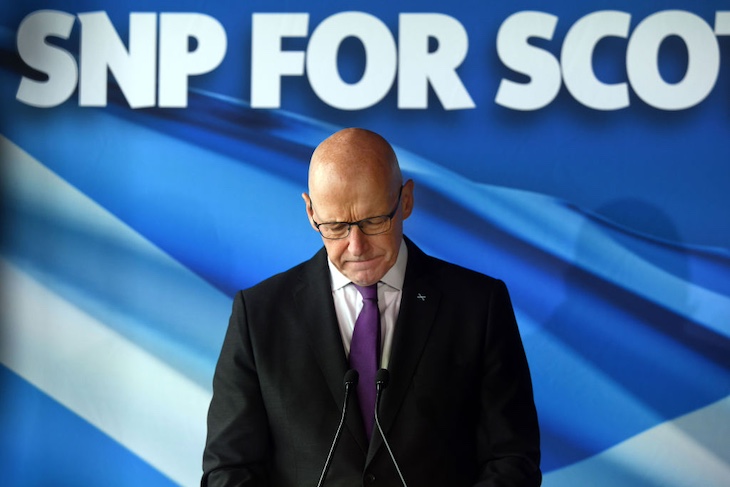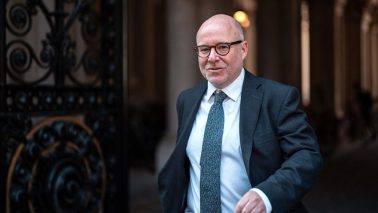Of all the self-inflicted harm to have felled politicians and undermined governments, was there ever a more curious case than that of self-ID and the SNP?
In so bullishly battling the cause of Gender Recognition Reform (GRR), that would have allowed for trans-identifying people to self-declare their new gender, the SNP suffered the largest backbench rebellion of the Scottish parliament’s 25-year tenure, saw a minister defect to Alex Salmond’s Alba party, and lost two first ministers in rapid succession.
And after all such calamity, the SNP’s GRR Act was merely blocked by Westminster using a Section 35 order, a dead man’s switch designed to prevent Holyrood’s lawmakers passing incompetent bills that interfere in UK-wide legislation.
One might think that a new leader of Scotland’s governing party – now fire-fighting on multiple fronts, skint and deflated – would distance himself from an issue that caused nothing but misery for his predecessors.
Apparently not. For John Swinney, and the MSPs who backed the call for Gender Recognition Reform, there have been two recent fresh calamities.
Self-ID did not become law in Scotland, yet the confusion on the issue has led to public bodies acting as though it has. It emerged Police Scotland had allowed, in principle, for rapists to self-ID as women to foster ‘a strong sense of belonging’.
Swinney was grilled on this at First Minister’s Questions. Tory MSP Rachael Hamilton asked whether the FM believed ‘male rapists’ – an unnecessary tautology, given that only men can rape – should be allowed to ‘get their way’ by manipulating the justice system.
Swinney reacted with fury, saying he refused to be associated with the framing of the question. His repeated response to three women MSPs who pushed him was to say he cannot interfere in policing matters. This is limp tosh. The SNP championed the cause of self-ID and created an atmosphere of public discourse without space for nuance or compromise whereby dissent was quelled by charges of bigotry.
Now the First Minister has been left looking weak. At a meeting of the Scottish Police Authority, the chief constable Jo Farrell, confirmed a U-turn on the policy: rapists will now be recorded as male, no matter how they identify. That this is even a matter for discussion is symptomatic of how poorly handled the GRR question has been in Scotland.
And so to the second issue, an independent review of the work of Edinburgh Rape Crisis Centre (ERCC).
Earlier this year, an employment tribunal found an ERCC worker, Roz Adams, had been unfairly constructively dismissed in retaliation against her gender-critical beliefs.
In light of the tribunal’s findings and the independent review, CEO Mridul Wadhwa – a trans woman – resigned. Wadhwa had been found by the employment tribunal judge to be the ‘the invisible hand behind everything that had taken place’, and that there had been a ’heresy hunt’.
The subsequent review, which came out two weeks ago, is more damning. It found Wadhwa ‘failed to set professional standards of behaviour’.
In the Scottish parliament, the Minister for Equalities was pressed on the ERCC situation. After a rambling reply, Kaukab Stewart MSP said, ‘I have lost track of the question’.
This is one of the seminal questions of modern Scottish politics. It created a situation whereby Scotland’s first female First Minister – a self-proclaimed ‘feminist to my fingertips’ – became the bitter enemy of the country’s largest grassroots feminist movement. Swinney, like so many others, must consider Nicola Sturgeon’s prioritisation of self-ID and ask himself, ‘What on earth was she thinking?’
This is one of the seminal questions of modern Scottish politics
Sturgeon, trying to establish her leadership and distance herself from her predecessor Alex Salmond, was trying to build a power base within the SNP and young people were critical to this aim. There is an entirely separate column to be written on the youth capture of the SNP and how the desperation to scoop up young people’s votes led to a tacking left that may, come the 2026 Holyrood election, contribute to the party’s loss of power.
But self-ID required empathetic yet rigorous handling. Instead, it has become the greatest political failure of the Scottish parliament, one that might have been avoided, if only women had been listened to.
Scotland is still parsing the 10th anniversary of the Scottish independence referendum. Nicola Sturgeon, once the poster girl of the movement, commanding stadium audiences, was noticeable by her absence from the commemoration events.
Until there is clarity and leadership on the issue, the SNP will continue to suffer unnecessary damage.







Comments